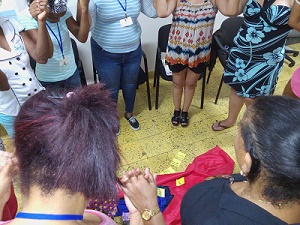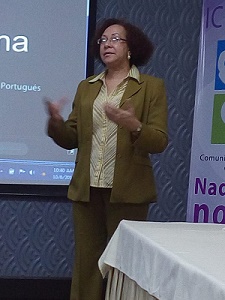Also available in: Español
Miranda Suero. Corresponsales Clave.
The International Community of Women Living with HIV-AIDS (ICW) presented in Dominican Republic the results of a study on the legal framework and policies related to gender equity and equality, sexual and reproductive health and violence against women living with HIV in the country.
The presentation of the study, which has been replicated in several countries, took place on October 6, within the framework of the project Accelerating Regional Action in Favor of Human, Sexual and Reproductive Rights and Non Violence against Women with HIV. The event was attended by personalities linked to government agencies and national media.
After the presentation, a meeting was organized for women leaders on October 7, 8 and 9, where activists were trained to promote the advocacy plan, according to practical and strategic needs of women with HIV in Dominican Republic, strengthening at the same time internal capacities of the ICW Latina chapter in the country. We will summarize the details of the meeting in a future article.
After reviewing the constitution and several laws, regulations and protocols on care to people with HIV, some policy instruments were identified which – by mention or omission – violate the human rights of women with HIV in Dominican Republic. Among the policy instruments, the one that caught most attention was on the subject of obstetric violence against women with HIV, which does not give pregnant women the option to choose the type of delivery they wish to have, all of them undergoing a Caesarean section. It is so stated in the Care Guide that was regulated around three months ago, despite the suggestion of the World Health Organization (WHO) since 2009 that suggests that any woman with less than one thousand copies of viral load may choose vaginal delivery with no risk to the baby, which is applied in several countries of the region.
Dominican Republic has the highest rate of unnecessary Caesarean sections in the world (56%), according to a study carried out by the “Colectiva Mujer Salud” in 2015, although the WHO recommends up to 15%.
In this context, the women members of ICW-DR decided to advocate politically for the review of the Law on Sexual and Reproductive Health, the Guide for Care to People with HIV and Care Protocols, to include in a clear and direct way the option of vaginal delivery for women with HIV and the choice of contraceptive method they wish to use. Until now, they are only offered the male condom; so the event participants said.
Two pregnant women asked on the subject said that vaginal delivery allows them to recover and return to their daily life sooner, so they believe it would be their best option, where as an OB-GYN said that he did not know anything about the subject.
These findings show a dimension of the epidemic little discussed in the region. It is the first time that the Global Fund to Fight AIDS, tuberculosis and malaria has resources for projects specifically on women with HIV in context of concentrated epidemics, such as Latin America, that have allowed to make their problems visible. Currently, eleven countries in the region have 4.3 million to make political advocacy plans linked to gender based violence for a period of just over two years.
According to the study presented by Jeannete Tineo, HIVOS advisor – main recipient of the proposal-, in Latin America and The Caribbean there are still many weaknesses in health services that do not guarantee the rights of women with HIV; however, in all the constitutions of the region, the laws provide rules that include women rights, although they do not make specific reference to women with HIV. These studies will be very useful tools for regional advocacy, taking also into account international treaties and conventions.
Hilda Esquivel, from ICW Mexico, suggested fostering partnerships with other women institutions in the country to coordinate and strengthen community based organizations and bring new faces to the HIV subject in order to position women demands in the plans for the response to HIV.
The ICW project is just starting and it is expected it will revitalize leadership of women with HIV in the region, leadership that had been dormant in recent years.


